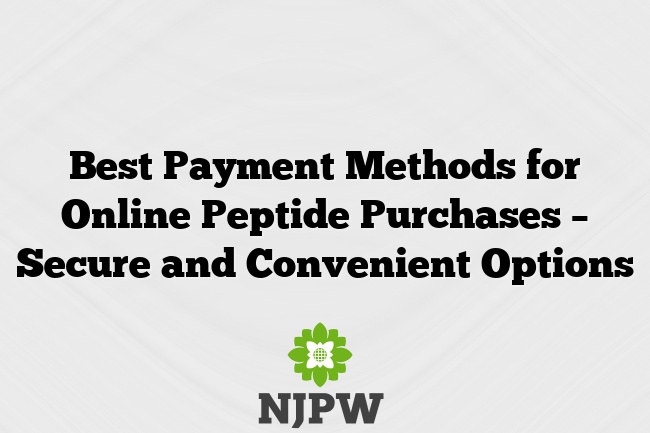How Long Does It Take for Peptides to Work? – The Surprising Timeline Revealed

Peptides have been making waves in the health and wellness industry, offering a promising solution for a wide range of conditions. These remarkable compounds have the potential to revolutionize the way we approach various aspects of our well-being. But one question that often arises is, “How long does it take for peptides to work?” The answer to this query is both fascinating and complex, as it depends on a variety of factors.
| Key Factors Affecting Peptide Onset | Timeframe for Noticeable Results |
|---|---|
| Route of Administration (Oral vs. Injectable) | 2-4 Weeks for Oral, 1-2 Weeks for Injectable |
| Dosage and Concentration | Varies Based on Individual Needs |
| Bioavailability and Absorption Rate | Depends on Peptide Type and Formulation |
To begin, it’s important to understand what peptides are and how they work. Peptides are short chains of amino acids that play a crucial role in various bodily functions, from regulating hormone levels to supporting muscle growth and recovery. These compounds are often used as peptide supplements to address a wide range of health concerns, from anti-aging to performance enhancement.
The absorption and bioavailability of peptides are key factors that determine the onset of their effects. Peptides can be administered through various routes, such as oral or injectable forms, each with its own unique characteristics. Oral peptides, for instance, must navigate the digestive system, which can impact their bioavailability and the time it takes for them to be absorbed into the bloodstream. In contrast, injectable peptides often have a faster onset of action, as they bypass the digestive system and are directly introduced into the body.
Factors Affecting the Onset of Effects
In addition to the route of administration, several other factors can influence the timeline for noticeable results with peptides. The dosage and concentration of the peptide compound play a crucial role, as higher doses and more potent formulations may produce quicker effects. Individual variation in factors such as metabolism, body composition, and overall health can also contribute to the peptide onset time.
Typical Timeframes for Noticeable Results
Generally, oral peptides may take 2-4 weeks to produce noticeable effects, while injectable peptides can often be observed within 1-2 weeks. However, it’s important to note that these timelines are approximate and can vary significantly based on the specific peptide, the individual’s response, and the intended purpose of use.
Maximizing the Effectiveness of Peptides
To maximize the effectiveness of peptides, it’s crucial to follow the recommended dosage and administration protocol provided by healthcare professionals or reputable manufacturers. Additionally, ensuring proper storage and handling of peptide supplements can help maintain their potency and stability, further enhancing their efficacy.
Comparing Oral vs. Injectable Administration
The choice between oral and injectable peptides often comes down to individual preference, as well as the specific goals and needs of the user. Oral peptides may be more convenient for some, while injectable forms can provide a faster and more direct delivery of the compounds. Ultimately, consulting with a healthcare provider can help determine the most suitable peptide delivery method for each individual.
The Role of Dosage in Peptide Onset
The dosage of a peptide compound can significantly impact the onset of effects. Higher doses may lead to quicker results, but it’s essential to find the right balance to avoid potential side effects or safety concerns. Working closely with a healthcare professional to determine the optimal peptide dosage is crucial for achieving the desired outcomes.
Understanding Individual Variation
It’s important to recognize that individual differences in factors such as metabolism, body composition, and overall health can influence the peptide onset time and the overall effectiveness of the compounds. What works for one person may not necessarily produce the same results for another, highlighting the importance of personalized peptide supplementation and monitoring.
Enhancing the Compound’s Potency
To further enhance the potency and effectiveness of peptides, various strategies can be employed, such as optimizing the formulation, improving the delivery method, and incorporating complementary nutrients that support the peptide’s mechanism of action. These approaches can help maximize the peptide benefits and ensure the best possible outcomes.
Long-Term Benefits and Sustained Effects
While the initial onset of effects is important, the long-term benefits and sustained effects of peptides are equally crucial. Consistent use, along with a healthy lifestyle and proper dosage management, can lead to lasting improvements in areas such as anti-aging, muscle growth, hormone regulation, and overall well-being.
Conclusion
The timeline for peptides to work can vary significantly, depending on a multitude of factors. By understanding the absorption and bioavailability of these compounds, as well as the various factors that can influence their onset of effects, individuals can make informed decisions and work closely with healthcare professionals to maximize the effectiveness of their peptide supplementation regimen. With patience, consistency, and a personalized approach, the benefits of peptides can be fully realized.
Frequently Asked Questions
How long does it typically take for peptides to start working?
The time it takes for peptides to start working can vary, but generally, oral peptides may take 2-4 weeks to produce noticeable effects, while injectable peptides can often be observed within 1-2 weeks. However, individual factors, dosage, and the specific peptide compound can all influence the onset timeline.
Can I feel the effects of peptides immediately?
It is unlikely to feel the effects of peptides immediately, as they require time to be absorbed, distributed, and exert their intended physiological responses. Patience and consistent use are essential for experiencing the full benefits of peptide supplementation.
How long do the effects of peptides last?
The duration of the effects of peptides can depend on factors such as the half-life of the specific compound, the route of administration, and individual differences. Typically, the effects of peptides can last for several hours to several days, with the potential for long-term benefits with consistent use over time.






